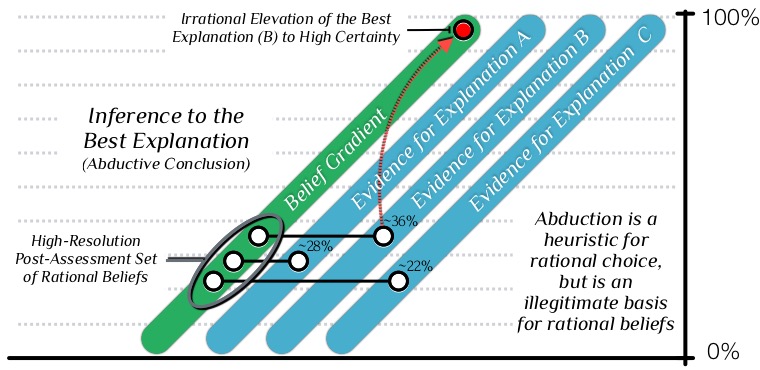 Imagine a grade school teacher named George with 30 students in his class. One day George discovers that the candy he had placed on a very high self in the classroom is missing. So he lines up his students from tallest to shortest, and discovers that Timmy is the tallest. George correctly infers that Timmy is the best explanation for the missing candy, and immediately expels Timmy from school. Has George done anything wrong? Have you been encouraged by Christian leaders to arrive at conclusions the same way George does?
Imagine a grade school teacher named George with 30 students in his class. One day George discovers that the candy he had placed on a very high self in the classroom is missing. So he lines up his students from tallest to shortest, and discovers that Timmy is the tallest. George correctly infers that Timmy is the best explanation for the missing candy, and immediately expels Timmy from school. Has George done anything wrong? Have you been encouraged by Christian leaders to arrive at conclusions the same way George does?
This notion of “inference to the best explanation” is also called “abductive reasoning”. And it does have some, if limited, value. For example, if George in the scenario above was looking for someone to place the candy on the high shelf, George might have rationally asked Timmy to do the task since Timmy is the tallest student. But abductive reasoning is not appropriate for assessing justified nuanced degrees of belief about particular causes. It is only useful in making binary decisions, some of those decisions being the least likely to fail among many very likely unsuccessful candidate decisions. Your choice of the best, but very probably unsuccessful option, should not force you to then increase your belief in the likely success of the choice from unlikely to highly likely.
Christian leaders will often argue that Christianity is the best explanation for the way things are. However, as depicted in the accompanying graphic, if there are three candidate explanations, and the best explanation has a 36% likelihood of being correct, it is highly irrational to then place a higher confidence in the notion that this explanation is the true explanation. You can not promote your initial 36% degree of confidence to near 100% simply because it is the best explanation. Timmy should not be considered a thief simply because you have assessed Timmy as the most likely though still highly improbable cause for the missing candy. Therefore, this focus on the best explanation is an inadequate foundation for an appropriate epistemology (theory of belief). An appropriate epistemology will not collapse a highly nuanced inductively determined set of probabilities across all the explanations or options to irrationally elevate the best explanation to near certainty. For a deeper discussion of the weakness of inferring to the best explanation, see “Supplementary E”.
For a deeper discussion of the weakness of inferring to the best explanation, see “Supplementary E”.
ADDITIONAL NOTES:
One good example of the failure of “inference to the best explanation” is the alleged resurrection of Jesus. Let’s take a look at the possible explanations to which we must assign a degree of likelihood.
- A dead body is resurrected after three days of death.
- A body is stolen from a guarded grave.
- People go to the wrong grave and find it empty.
- A person is found not actually dead after being removed from a cross.
- People conspire to claim a body rose after three days being dead.
- A story is fabricated about someone rising after three days.
All of these are improbable. Once we determine which is the best explanation, are we justified in then increasing our degree of confidence in this explanation from improbable to probable? Of course not. Yet this is the way many Christian leaders present the argument. This focus of Christian leaders on an inference to the best explanation is inherently flawed. The high-resolution probabilistic assessment of all the explanations or options should not be collapsed by an inference to the best explanation into an unwarranted raising of the likelihood to near certainty. See #49 for a more detailed discussion of the problem with resurrection claims. See “Supplementary C” for a deeper discussion on assessing probabilities.
Another worthy questions is “if the resurrection is so pivotal to Christianity, why Jesus would not have remained on the Earth for a couple of centuries after his resurrection to indisputably establish his immortality and divinity?” Why is the evidence offered for such an extraordinary claim so tenuous? Does this not parallel the modus operandi of other religions with similar dubious claims? Would clear evidence for the resurrection have taken away our free will? See #29 for a longer discussion on this notion.

